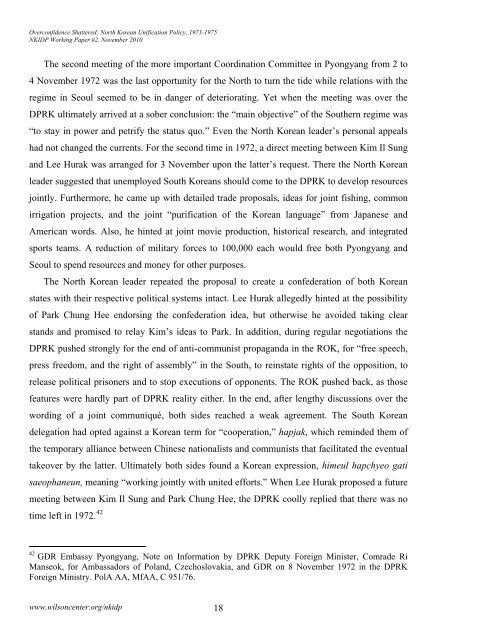Overconfidence Shattered: North Korean Unification Policy, 1971 ...
Overconfidence Shattered: North Korean Unification Policy, 1971 ...
Overconfidence Shattered: North Korean Unification Policy, 1971 ...
- No tags were found...
Create successful ePaper yourself
Turn your PDF publications into a flip-book with our unique Google optimized e-Paper software.
<strong>Overconfidence</strong> <strong>Shattered</strong>: <strong>North</strong> <strong>Korean</strong> <strong>Unification</strong> <strong>Policy</strong>, <strong>1971</strong>-1975NKIDP Working Paper #2, November 2010The second meeting of the more important Coordination Committee in Pyongyang from 2 to4 November 1972 was the last opportunity for the <strong>North</strong> to turn the tide while relations with theregime in Seoul seemed to be in danger of deteriorating. Yet when the meeting was over theDPRK ultimately arrived at a sober conclusion: the “main objective” of the Southern regime was“to stay in power and petrify the status quo.” Even the <strong>North</strong> <strong>Korean</strong> leader’s personal appealshad not changed the currents. For the second time in 1972, a direct meeting between Kim Il Sungand Lee Hurak was arranged for 3 November upon the latter’s request. There the <strong>North</strong> <strong>Korean</strong>leader suggested that unemployed South <strong>Korean</strong>s should come to the DPRK to develop resourcesjointly. Furthermore, he came up with detailed trade proposals, ideas for joint fishing, commonirrigation projects, and the joint “purification of the <strong>Korean</strong> language” from Japanese andAmerican words. Also, he hinted at joint movie production, historical research, and integratedsports teams. A reduction of military forces to 100,000 each would free both Pyongyang andSeoul to spend resources and money for other purposes.The <strong>North</strong> <strong>Korean</strong> leader repeated the proposal to create a confederation of both <strong>Korean</strong>states with their respective political systems intact. Lee Hurak allegedly hinted at the possibilityof Park Chung Hee endorsing the confederation idea, but otherwise he avoided taking clearstands and promised to relay Kim’s ideas to Park. In addition, during regular negotiations theDPRK pushed strongly for the end of anti-communist propaganda in the ROK, for “free speech,press freedom, and the right of assembly” in the South, to reinstate rights of the opposition, torelease political prisoners and to stop executions of opponents. The ROK pushed back, as thosefeatures were hardly part of DPRK reality either. In the end, after lengthy discussions over thewording of a joint communiqué, both sides reached a weak agreement. The South <strong>Korean</strong>delegation had opted against a <strong>Korean</strong> term for “cooperation,” hapjak, which reminded them ofthe temporary alliance between Chinese nationalists and communists that facilitated the eventualtakeover by the latter. Ultimately both sides found a <strong>Korean</strong> expression, himeul hapchyeo gatisaeophaneun, meaning “working jointly with united efforts.” When Lee Hurak proposed a futuremeeting between Kim Il Sung and Park Chung Hee, the DPRK coolly replied that there was notime left in 1972. 4242 GDR Embassy Pyongyang, Note on Information by DPRK Deputy Foreign Minister, Comrade RiManseok, for Ambassadors of Poland, Czechoslovakia, and GDR on 8 November 1972 in the DPRKForeign Ministry. PolA AA, MfAA, C 951/76.www.wilsoncenter.org/nkidp 18
















